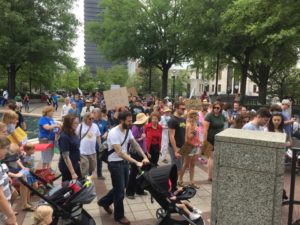
By Mark Linn
March for Science Birmingham

Thousands of scientists and their supporters turned out Saturday, April 22, at Linn Park as part of the national March for Science.
Organizers say the march was intended to be both a celebration of science and a protest against what they see as threats to research and education brought about by funding cuts and political priorities. The goals of the march were to promote science, science education and science-based public policy, they say.
Organizers estimate that the call to action brought out more than 2,000 demonstrators as well as more than a dozen science and advocacy organizations, such as the McWane Science Center, 500 Women Scientists, AIDs Alabama and the Alabama Rivers Alliance, who all had tables set up in the park prior to the march.
The event was staged to coincide with a march in Washington D.C. along with more than 500 other satellite marches across the world, including three others across the state in Mobile, Huntsville and Montgomery.
“I think The March went very well today,” said Jeff Hirschy, one of the organizers. “The speakers and the organizations that were represented showed everyone in attendance the importance of science in our everyday life. We hope that today’s events serve as a starting point on the path towards a stronger relationship between the public and science in Birmingham.”
The event also featured several speakers from the science and activist communities. These included Leslie Hendon, Ph.D., a professor at UAB’s Department of Biology who spoke on what the public can do for science; Mitch Reid of the Alabama River Alliance, who spoke of clean water and Randall Haddock, Ph.D., field director of the Cahaba River Society who talked about the importance of conservation.
“Everyone should feel invested in math and science — that’s the only way funding for science and protection from special interests can be assured,” said Robin Rains, a local activist and one of the speakers that took the stage before the march. “Environmental conservation wasn’t always so divisive, public education wasn’t always divisive — even climate change and evolution weren’t divisive until special interests caused them to be. The only way to safeguard anything in our country is for everyone to feel invested in it. Science should be regarded as something of universal benefit.”
A major partner for the march was the Greater Birmingham Alliance to Stop Pollution, a 501c3 nonprofit that works to reduce air pollution and educate the public on the benefits of clean air. Other community partners who provided support leading up to the march include Good People Brewing Company and Lucy’s Coffee and Tea.
The organizers hope that the march will be just a start for their science advocacy in Alabama. In the coming days and weeks, Birmingham March for Science has several other events planned, including a panel on health care, advocacy for local science education and promoting local Birmingham and statewide groups such as the Cahaba River Society.
To find out more about the Birmingham March for Science, including future plans, visit marchforsciencebham.org



